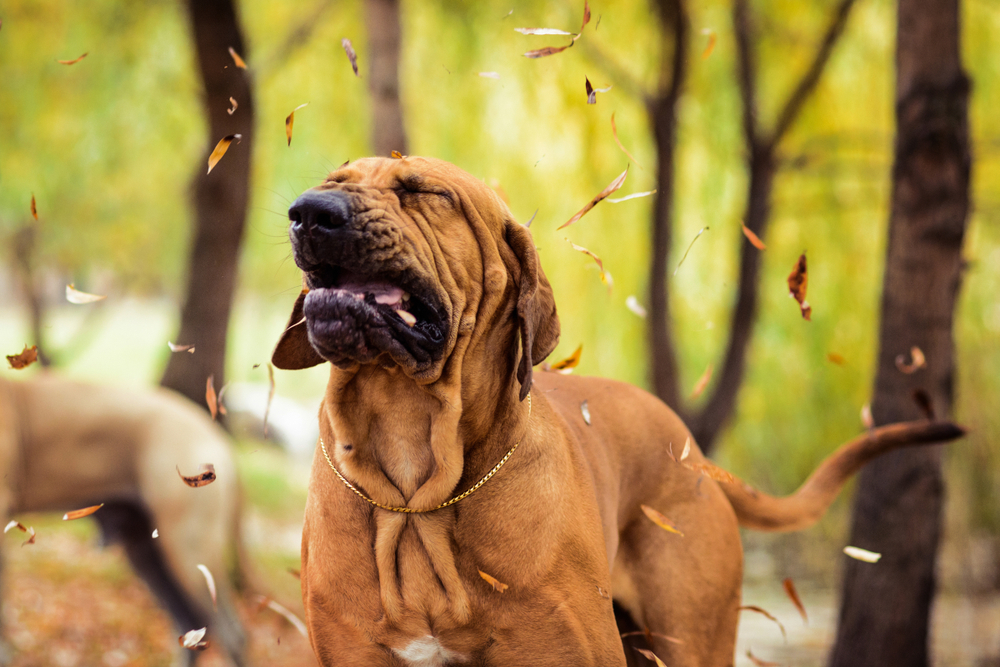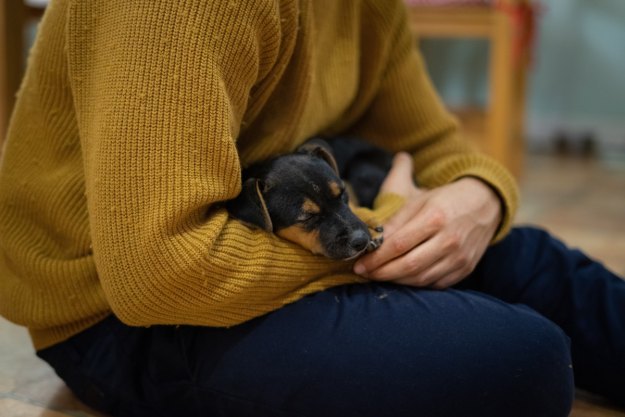Pollen, chemical fumes, insect bites, and certain types of food are all common allergens in humans. Symptoms range from mild annoyances, such as itchy, watery eyes, to life-threatening anaphylaxis. For the most part, it’s easy to tell when a fellow human is suffering from an allergic reaction. But what about a dog’s allergic reaction? They might not be as immediately recognizable as your seasonal allergies, but there are signs to keep an eye out for if you suspect your dog has allergies. We’ll tell you what to look for, what you can do to help, and give you a general idea of how long your precious pooch will have to deal with the symptoms of an allergic reaction.

How can I tell if my dog is having an allergic reaction?
Just like you, it’s possible for your dog to suffer from unique allergies. For brevity’s sake, we’ll cover the four most common causes of allergic reactions in dogs.
Acute allergic reactions
Unlike a chronic allergic condition, an acute allergy is a sudden response to an irritant, such as a sting or bite from an insect. There are other causes of acute allergies in dogs, but stings and bites are the most common. Swelling, itching, and vomiting are common, but dogs suffering from anaphylactic shock could experience difficulty breathing, show signs of cyanosis – a bluish tint to the lips and gums caused by the lack of proper blood oxygenation – and might even lose consciousness.
Food allergies
Yet another common allergy dogs suffer from, a food allergy often causes stomach upset like nausea, vomiting, and diarrhea. That being said, some dogs might develop skin conditions, begin to show signs of brittle fur, or might even suffer from the loss of fur. If your pup begins scratching at himself while suffering from gastrointestinal issues, it’s very possible he’s allergic to something in his kibble. To determine the allergen, your dog’s vet might recommend an elimination diet, or he may prescribe a formula developed for dogs with food sensitivities, such as this one from Hill’s Prescription Diet.
Seasonal allergies
Some people are overjoyed when spring rolls around each year. Others dread the sudden flare-up of seasonal allergies. And your dog might concur! Just like people, dogs can suffer from seasonal allergies with similar symptoms, such as puffy, watery eyes, itchy skin, ear infections, a running nose, and sneezing fits. While you should speak with your vet to make sure your dog’s condition is related to seasonal allergies, if you notice him sneezing at the same time every year, that’s likely the case.
Skin allergies
Just like some people have sensitive skin, so do some dogs. Whether your pooch has been exposed to an irritant from fleas, ticks, plants, chemicals, or even the detergent you use to wash your linens, skin allergies are miserable. Look for symptoms like hives, dry and flaky skin, redness of the skin, and itching. Make sure your precious pooch is on a flea and tick preventative, take precautions when growing certain types of plants and flowers, and use a gentle, fragrance-free detergent to wash any fabrics your dog comes into contact with.

What can I give my dog for an allergic reaction?
When it comes to treating your dog’s allergies, look no further than your own medicine cabinet. Benadryl, a common antihistamine used to treat allergies, works as effectively in dogs as it does in humans. Thanks to the main ingredient, diphenhydramine HCI, Benadryl combats the symptoms of allergies with minimal side effects. Unfortunately, the FDA has yet to approve Benadryl for veterinary use, but vets frequently recommend the use of Benadryl in treating dogs and cats with allergies. Make sure to administer the correct dosage for your dog’s weight, and speak to your vet before giving Benadryl if your pup is pregnant or suffers from hypertension, seizures, hypothyroidism, cardiovascular disease, glaucoma, or allergic lung disease.
How long will my dog’s allergic reaction last?
As much as we want to give you a cut-and-dried answer, the truth is… well, it depends on the allergen and the severity of your dog’s reaction. If your dog is suffering from a skin allergy, you can look for the redness and irritation to last somewhere between two and three weeks. If your pup has seasonal allergies, you can expect to see symptoms for as long as the allergen is in bloom. Allergic hives generally appear within minutes of exposure to an allergen, and they can fade just as quickly. However, hives can also last up to 48 hours, so don’t be overly concerned if they don’t clear up right away.

Final thoughts on allergies
Allergies are as uncomfortable for dogs as they are for us. Whether your pup is suffering from an insect sting, a skin reaction, seasonal allergies, or a food allergy, we recommend taking your pup to the vet for a thorough checkup. Antihistamines can help manage symptoms, but your vet might also prescribe oral, injectable, or topical steroids to help control your dog’s allergic reaction. Lastly, if your dog experiences difficulty breathing, you should take him to the emergency vet right away.
Editors' Recommendations
- 5 surefire ways to keep your dog off your bed and get a good night’s sleep
- Taking your dog’s collar off at night: Safe move or safety risk?
- How to tell if your older dog’s health decline means the end is near
- My dog is shaking and acting weird – should I worry?
- Xylitol is dangerous for dogs: 10 surprising products that contain it as a hidden ingredient




